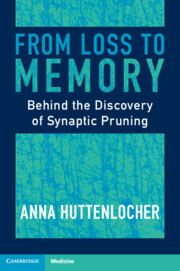Book contents
- From Loss to Memory
- From Loss to Memory
- Copyright page
- Dedication
- Contents
- Preface
- Acknowledgments
- 1 Counting Synapses
- 2 Discovering Synaptic Pruning
- 3 Else, Peter’s Mother
- 4 Richard, Peter’s Father, and Peter’s Uncle Fritz
- 5 Greiz: Kriegskinder (Children of War)
- 6 In Braubach, after the War
- 7 Arrival in America
- 8 Harvard Medical School
- 9 Understanding Sleep and Consciousness: Research at the National Institutes of Health
- 10 Entering the Cognitive Revolution: Neuroscience and Cognitive Psychology
- 11 Physician First, Scientist Second?
- 12 Comparative Brain Regions and Synapse Formation
- 13 Stimulating Progress on Developmental Brain Disorders
- 14 Neurodevelopmental Disorders and Schizophrenia: A Role for Synaptic Pruning?
- 15 Early Childhood Education
- 16 Peter and Janellen’s Collaboration
- 17 Microglial Cells and the Mechanisms of Synaptic Pruning
- 18 Looking Forward: Being a Physician and a Scientist
- 19 Parkinson’s Disease and Berlin
- 20 Auf Deutsch: Back to German
- 21 Memories and Reflections at the End: A Return Trip to Greiz
- Glossary
- Index
- References
1 - Counting Synapses
Published online by Cambridge University Press: 10 October 2023
- From Loss to Memory
- From Loss to Memory
- Copyright page
- Dedication
- Contents
- Preface
- Acknowledgments
- 1 Counting Synapses
- 2 Discovering Synaptic Pruning
- 3 Else, Peter’s Mother
- 4 Richard, Peter’s Father, and Peter’s Uncle Fritz
- 5 Greiz: Kriegskinder (Children of War)
- 6 In Braubach, after the War
- 7 Arrival in America
- 8 Harvard Medical School
- 9 Understanding Sleep and Consciousness: Research at the National Institutes of Health
- 10 Entering the Cognitive Revolution: Neuroscience and Cognitive Psychology
- 11 Physician First, Scientist Second?
- 12 Comparative Brain Regions and Synapse Formation
- 13 Stimulating Progress on Developmental Brain Disorders
- 14 Neurodevelopmental Disorders and Schizophrenia: A Role for Synaptic Pruning?
- 15 Early Childhood Education
- 16 Peter and Janellen’s Collaboration
- 17 Microglial Cells and the Mechanisms of Synaptic Pruning
- 18 Looking Forward: Being a Physician and a Scientist
- 19 Parkinson’s Disease and Berlin
- 20 Auf Deutsch: Back to German
- 21 Memories and Reflections at the End: A Return Trip to Greiz
- Glossary
- Index
- References
Summary
My father, a practicing pediatric neurologist, was also a scientist. As a child, I remember my father peering at hundreds of micrographs of neuronal connections. Billions of these small connections form between neurons in the developing brain. Over the years he counted many, many synapses in post-mortem brain samples. A US immigrant who grew up in wartime Germany, he quietly shouldered his own childhood experiences. And he gained lasting fame – among neuroscientists and others – by discovering something fundamental. Brain synaptic connections increase dramatically during early human development, as anyone might expect. But Peter – Dad – Dr. Huttenlocher – discovered that, by the millions, these connections are also selectively removed as we learn and develop. This process, now referred to as synaptic pruning, is the process of refinement that mediates our skills, our abilities and our memories [1].
Information
- Type
- Chapter
- Information
- From Loss to MemoryBehind the Discovery of Synaptic Pruning, pp. 1 - 4Publisher: Cambridge University PressPrint publication year: 2023
